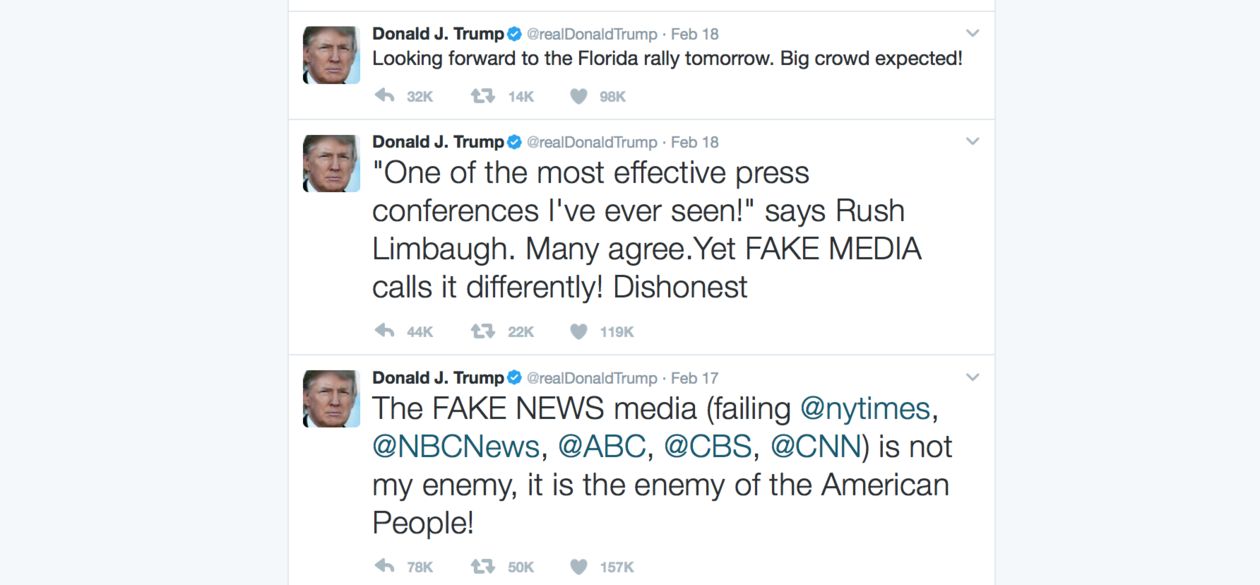Elizabeth Losh: @ctivism: Call Out Culture, Hashtag Activism, and Donald Trump’s Twitter Feed
Digital rhetorician, Liz Losh, analyses Trump's tweets as a parallel to consumer revolt, a rhetorical strategy facilitated by Twitter's interface.

Main content
This talk, hosted by UiB's Digital Culture Research Group, examines how the themes of digital transparency and disintermediation, which were popular touchstones in the Obama administration, were exploited in the election of Donald J. Trump. Using data from the archive of Trump’s Twitter feed it analyzes how the 2016 Republican candidate and 45th president of the United States appropriated the digital practices of call-out culture. Trump has also been frequently described as adept at using the tropes of identity politics. However, this talk differentiates Trump’s techniques from those of hashtag activists and claims that his distinctive modus operandi is closer to one deployed in consumer revolt. It also explores how Trump’s use of Twitter is characterized by the personalization of corporations, particularly technology and media companies, and how the design of Twitter facilitates this approach with “@” addresses.
Elizabeth Losh is an Associate Professor of English and American Studies at William and Mary with a specialization in New Media Ecologies. Before coming to William and Mary, she directed the Culture, Art, and Technology Program at the University of California, San Diego. She is a core member and former co-facilitator of the feminist technology collective FemTechNet, which offers a Distributed Open Collaborative Course, blogger for Digital Media and Learning Central, and part of the international organizing team of The Selfie Course.
She is the is the author of Virtualpolitik: An Electronic History of Government Media-Making in a Time of War, Scandal, Disaster, Miscommunication, and Mistakes (MIT Press, 2009) and The War on Learning: Gaining Ground in the Digital University (MIT Press, 2014). She is the co-author of the comic book textbook Understanding Rhetoric: A Graphic Guide to Writing (Bedford/St. Martin's, 2013; second edition, 2017) with Jonathan Alexander and editor of the forthcoming edited collection MOOCs and Their Afterlives: Experiments in Scale and Access in Higher Education (University of Chicago, 2017).
In addition to recent work on selfies and hashtag activism, she has also written a number of frequently cited essays about communities that produce, consume, and circulate online video, videogames, digital photographs, text postings, and programming code. The diverse range of subject matter analyzed in her scholarship has included coming out videos on YouTube, videogame fan films created by immigrants, combat footage from soldiers in Iraq shot on mobile devices, video evidence created for social media sites by protesters on the Mavi Marmara, remix videos from the Arab Spring, the use of Twitter and Facebook by Indian activists working for women’s rights after the Delhi rape case, and the use of Instagram by anti-government activists in Ukraine. Much of this body of work concerns the legitimation of political institutions through visual evidence, representations of war and violence in global news, and discourses about human rights. This work has appeared in edited collections from MIT Press, Routledge, University of Chicago, Minnesota, Oxford, Continuum, and many other presses.
